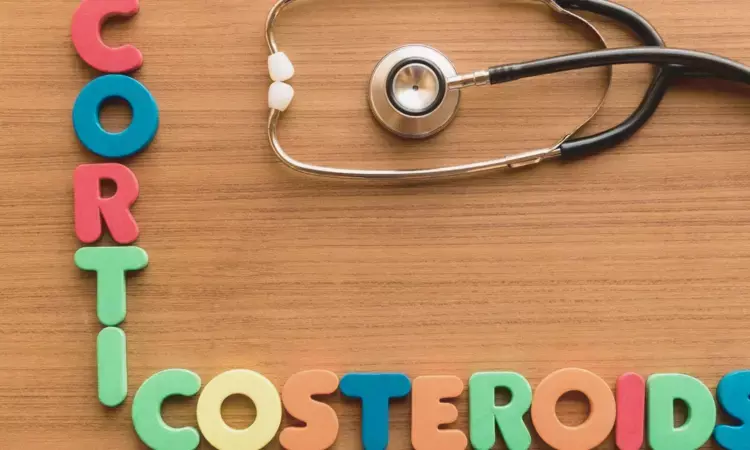- Home
- Medical news & Guidelines
- Anesthesiology
- Cardiology and CTVS
- Critical Care
- Dentistry
- Dermatology
- Diabetes and Endocrinology
- ENT
- Gastroenterology
- Medicine
- Nephrology
- Neurology
- Obstretics-Gynaecology
- Oncology
- Ophthalmology
- Orthopaedics
- Pediatrics-Neonatology
- Psychiatry
- Pulmonology
- Radiology
- Surgery
- Urology
- Laboratory Medicine
- Diet
- Nursing
- Paramedical
- Physiotherapy
- Health news
- Fact Check
- Bone Health Fact Check
- Brain Health Fact Check
- Cancer Related Fact Check
- Child Care Fact Check
- Dental and oral health fact check
- Diabetes and metabolic health fact check
- Diet and Nutrition Fact Check
- Eye and ENT Care Fact Check
- Fitness fact check
- Gut health fact check
- Heart health fact check
- Kidney health fact check
- Medical education fact check
- Men's health fact check
- Respiratory fact check
- Skin and hair care fact check
- Vaccine and Immunization fact check
- Women's health fact check
- AYUSH
- State News
- Andaman and Nicobar Islands
- Andhra Pradesh
- Arunachal Pradesh
- Assam
- Bihar
- Chandigarh
- Chattisgarh
- Dadra and Nagar Haveli
- Daman and Diu
- Delhi
- Goa
- Gujarat
- Haryana
- Himachal Pradesh
- Jammu & Kashmir
- Jharkhand
- Karnataka
- Kerala
- Ladakh
- Lakshadweep
- Madhya Pradesh
- Maharashtra
- Manipur
- Meghalaya
- Mizoram
- Nagaland
- Odisha
- Puducherry
- Punjab
- Rajasthan
- Sikkim
- Tamil Nadu
- Telangana
- Tripura
- Uttar Pradesh
- Uttrakhand
- West Bengal
- Medical Education
- Industry
Corticosteroid Use in Sepsis, ARDS, and Community-Acquired Pneumonia: SCCM Releases Updated Guidelines

USA: A significant update to the clinical guidelines on the use of corticosteroids in the management of sepsis, acute respiratory distress syndrome (ARDS), and community-acquired pneumonia (CAP) was published on January 8, 2025, in JAMA. This focused update, developed by the Society of Critical Care Medicine (SCCM), aims to refine treatment recommendations for critical care and internal medicine physicians, offering clearer directives on corticosteroid administration based on the latest evidence.
The recommendations are based on a comprehensive review of 82 randomized clinical trials (RCTs) that examined corticosteroid treatment across various critical illnesses. These studies were analyzed using the GRADE methodology to determine the strength of the evidence. The guideline targets critical care and internal medicine physicians, providing clarity on when and how to use corticosteroids in sepsis, ARDS, and CAP.
Sepsis and Septic Shock
For patients experiencing septic shock, the guideline offers a conditional recommendation for administering corticosteroids at a daily dose of less than 400 mg hydrocortisone equivalent. This decision is based on moderate certainty evidence that corticosteroids can reduce mortality, particularly in intensive care unit (ICU) settings. The evidence from 39 RCTs involving over 9,600 patients shows a slight reduction in ICU mortality with corticosteroid use (27.4%) compared to placebo or usual care (29.7%).
However, the panel strongly advises against using high-dose, short-duration corticosteroids, such as those exceeding 400 mg hydrocortisone equivalent to fewer than three days. Studies indicate that such regimens may increase the risk of hyperglycemia and secondary infections without substantially improving patient survival. Additionally, corticosteroids showed benefits in shock reversal and organ function reduction, emphasizing their role in managing septic shock.
Acute Respiratory Distress Syndrome (ARDS)
The guidelines also provide a conditional recommendation for corticosteroid use in adult patients hospitalized with ARDS, based on moderate certainty evidence. While corticosteroids were associated with a reduction in mortality (35.8% with steroids versus 44.6% without), the evidence remains less definitive regarding optimal dosing and duration. Notably, longer courses (more than seven days) were linked to better survival outcomes, while shorter courses did not demonstrate a significant mortality benefit.
Corticosteroid use in ARDS patients has also been associated with fewer days of mechanical ventilation and a shorter hospital stay, although these findings have low-certainty evidence.
Severe Community-Acquired Pneumonia (CAP)
For severe bacterial CAP, the update offers a strong recommendation for corticosteroid use. Evidence from 12 RCTs (involving over 2,100 patients) showed a significant reduction in hospital mortality, from 17.2% in the control group to 10.4% in the corticosteroid group. Corticosteroids also reduced the need for invasive mechanical ventilation, reinforcing their role in treating severe CAP. However, in patients with less severe CAP, corticosteroid use did not significantly affect mortality.
Future Directions
The 2024 update also highlights ongoing research aimed at refining corticosteroid treatment protocols for critical illnesses. Future trials like HYDRO-SHIP and COLOSSEUM may provide additional insights into corticosteroid efficacy in pneumonia and its potential to reduce myocardial injury in CAP patients.
As our understanding of corticosteroid use in critical care continues to evolve, these updated guidelines will be a crucial tool for clinicians managing sepsis, ARDS, and CAP in critically ill patients.
Reference:
Leung PB, Davis AM, Davis J. Corticosteroids for Sepsis, Acute Respiratory Distress Syndrome, or Community-Acquired Pneumonia. JAMA. Published online January 08, 2025. doi:10.1001/jama.2024.24537
Dr Kamal Kant Kohli-MBBS, DTCD- a chest specialist with more than 30 years of practice and a flair for writing clinical articles, Dr Kamal Kant Kohli joined Medical Dialogues as a Chief Editor of Medical News. Besides writing articles, as an editor, he proofreads and verifies all the medical content published on Medical Dialogues including those coming from journals, studies,medical conferences,guidelines etc. Email: drkohli@medicaldialogues.in. Contact no. 011-43720751


